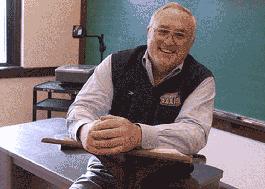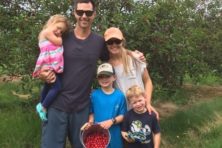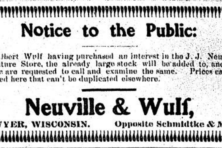Picking A Tough Fight
- Share
- Tweet
- Pin
- Share
He’s a self-described straight, married, fat old republican white guy. So why is Bill McConkey challenging the constitutional amendment banning gay marriage in Wisconsin that was approved overwhelmingly by the state’s voters in 2006?
“There are two motivating forces,” the Baileys Harbor resident and UW-Oshkosh professor explains. “The first is that I’m an educated man, a professor. From a constitutional and philosophical background, to be blunt, this is just evil. The idea that we can select a group of people and eliminate their rights and protections is wrong.”
The second force behind his decision? One of McConkey’s seven daughters is a lesbian.
“People ask if I would have filed if I didn’t have a gay daughter,” he says. “I’m not sure, but probably not. But they singled out one of my children, and I won’t tolerate that.”
McConkey filed suit in Dane County last July to try and overturn the amendment, contending that it was incorrectly presented to the voters on the ballot. The Wisconsin constitution, in Article XII, Section 1, states that “…if more than one amendment be submitted, they should be submitted in such a manner that the people may vote for or against such amendments separately.”
The amendment on the 2006 November ballot read as follows:
“Only a marriage between one man and one woman shall be valid or recognized as a marriage in this state. A legal status identical or substantially similar to that of marriage for unmarried individuals shall not be valid or recognized in this state.”
McConkey contends the second sentence in the amendment was confusing to voters because the first line outlaws gay marriage, while the second sentence outlaws anything similar to marriage, such as civil unions. He says gay marriage and civil unions are not interchangeable in his or most voters’ minds.
“Surveys showed voters would have approved of civil unions overwhelmingly,” he says, citing a 2006 survey done by Fairbank, Maslen, Maulin and Associates that found only 37 percent of respondents would approve of denying legal status to unions not called marriage but substantially similar to that of marriage.
The amendment passed easily, 59 – 41 percent, even though gay rights groups mounted a staunch campaign to defeat it.
The Wisconsin Family Council, which worked hard to pass the amendment in the run-up to the vote, directed questions to the Alliance Defense Fund. Jim Campbell, a litigation counselor with the organization in Scottsdale, AZ, denied the wording confused voters and said the challenge lacks merit.
“The people of Wisconsin overwhelmingly passed the amendment through a direct vote – the most democratic way possible,” he said. “McConkey doesn’t like the result and is trying to make an end run around the vote through the courts.”
McConkey was vocal in his opposition to the amendment when it was on the ballot in 2006, writing editorials and giving speeches against it.
Campbell said the amendment protects the institution of marriage by “affirming what the people believe marriage to be, the union of one man and one woman,” but McConkey believes it was a political maneuver.
“For the first time in history the majority of households in the U.S. aren’t home to a married couple,” McConkey points out. “It was a political deal to improve turnout of conservative voters to beat [Governor Jim] Doyle – a political battle. And gay couples had to pay the price.”
Further, McConkey called the amendment an ineffective way to protect marriage.
“There has never been a divorce suit filed in the United States because we didn’t have an amendment prohibiting gays from marrying,” he says. “If you want to protect marriage, make adultery a felony, that’ll clear out the legislature really fast. Make divorce harder. Bring back usury laws. Eliminate happy hours or close the bars at nine o’clock. That would actually help protect marriages.”
McConkey said his daughter is supportive of his effort, as are his colleagues at UW–Oshkosh, but some letters he has received have been less than kind.
“There’s not a lot of hate mail, but there’s been some, and always in the name of God,” McConkey says. But he says most people have been pretty nice to him and he’s received no grief from anyone in Door County.
He takes particular issue with those politicians who use religion to back their fight against gay rights.
“You can come up with a really long list of ways to sin against God,” he says. “Christ didn’t drive gays out of the temple, he drove bankers out. There are all kinds of sins, so why are they picking this one? Because it’s the one they’re not guilty of. They are guilty of most of the others.”
McConkey says his party strayed from its roots in putting the amendment on the ballot.
“With this, we used the constitution to give people the power to hurt people,” he says. “So who’s next? Do we start testing people’s IQ? The over-riding issue is shall the people of Wisconsin have the ability to designate certain groups of people as unworthy of rights and protection?”
Glenn Carlson, Interim Executive Director of Fair Wisconsin, thinks McConkey has a pretty good case.
“He focuses on a pretty narrow area of the constitution,” he says. “On first blush they seem like similar topics, but the public sees marriage as very different than civil unions.”
Carlson said the Fairbank survey makes a pretty strong argument that gay marriage and civil unions are seen as two separate issues by the voting public.
McConkey originally argued that the amendment contained four separate subjects, but Dane County Circuit Judge Richard G. Niess agreed he had standing on only two. At this point McConkey has only won the right to make an argument, which he’ll do in May.
McConkey is being represented in the case by prominent Madison attorney Lester Pines. His suit is the first challenge to the amendment in Wisconsin, and has garnered special notice because McConkey himself is not gay. Others have considered a suit, he says, but have backed off over concerns about recriminations and the challenge such an uphill battle presents.
“I understand fear, but I also believe people who aren’t afraid should fight for those who are.”





